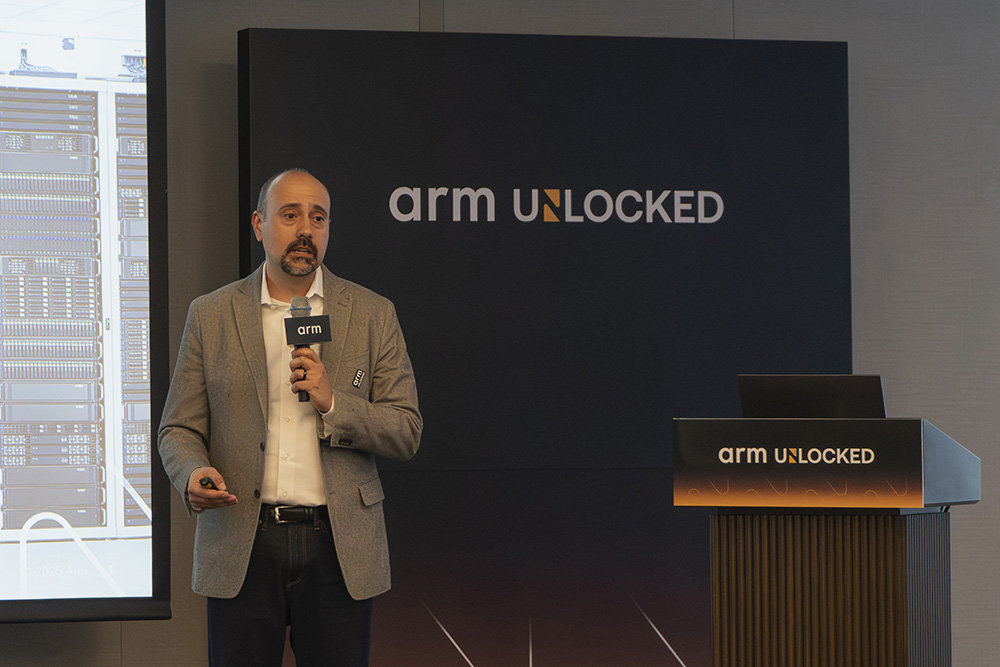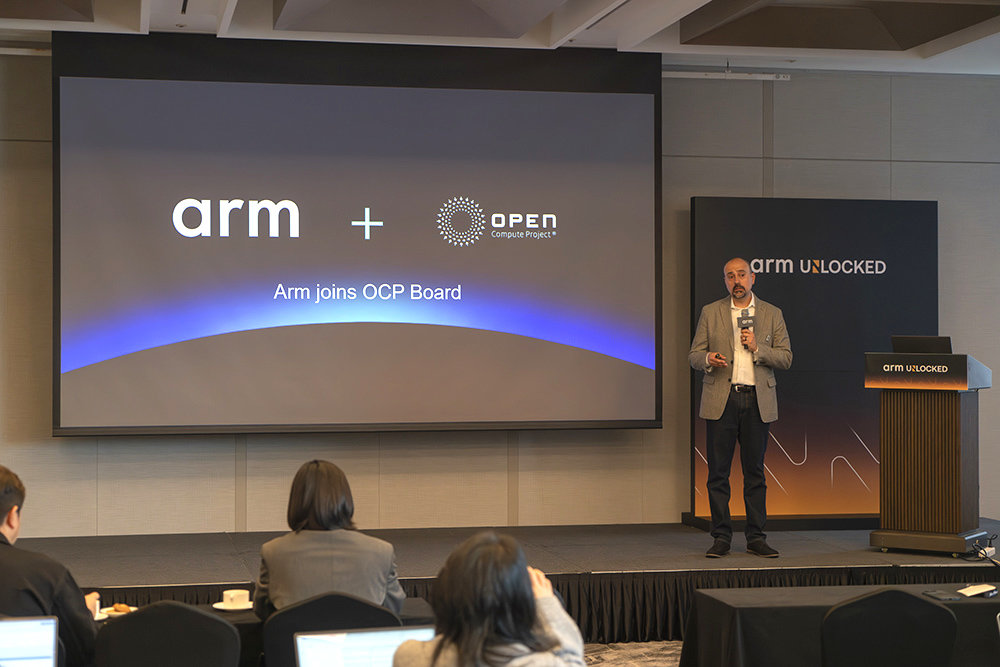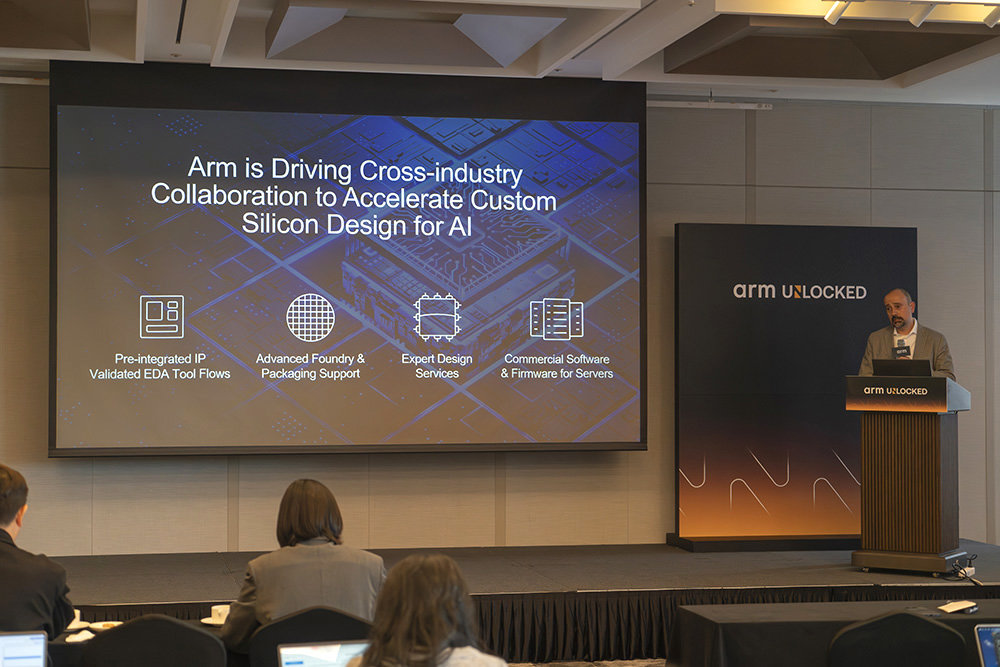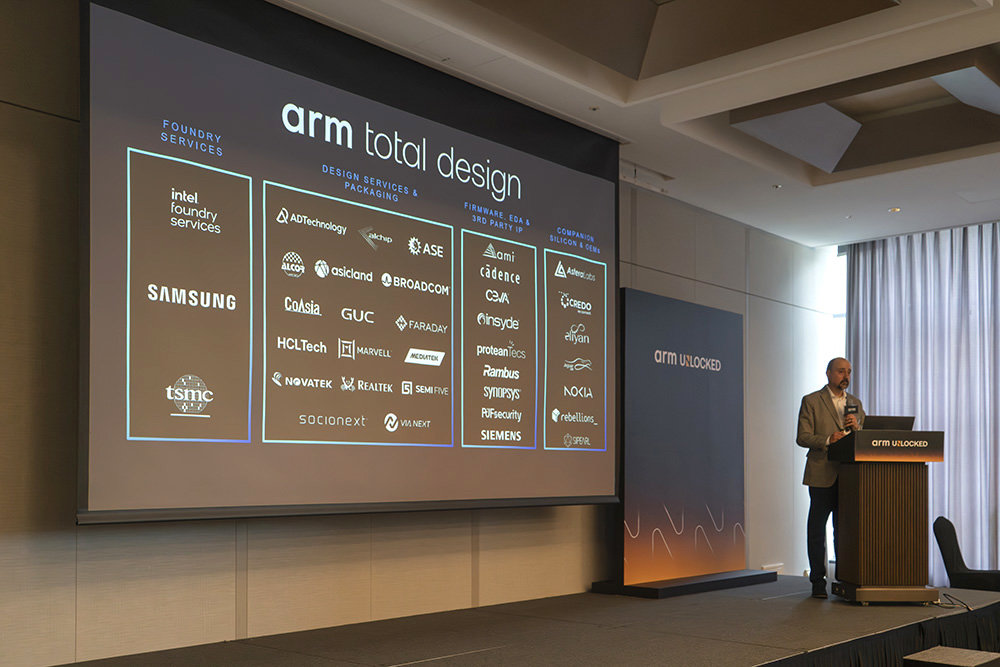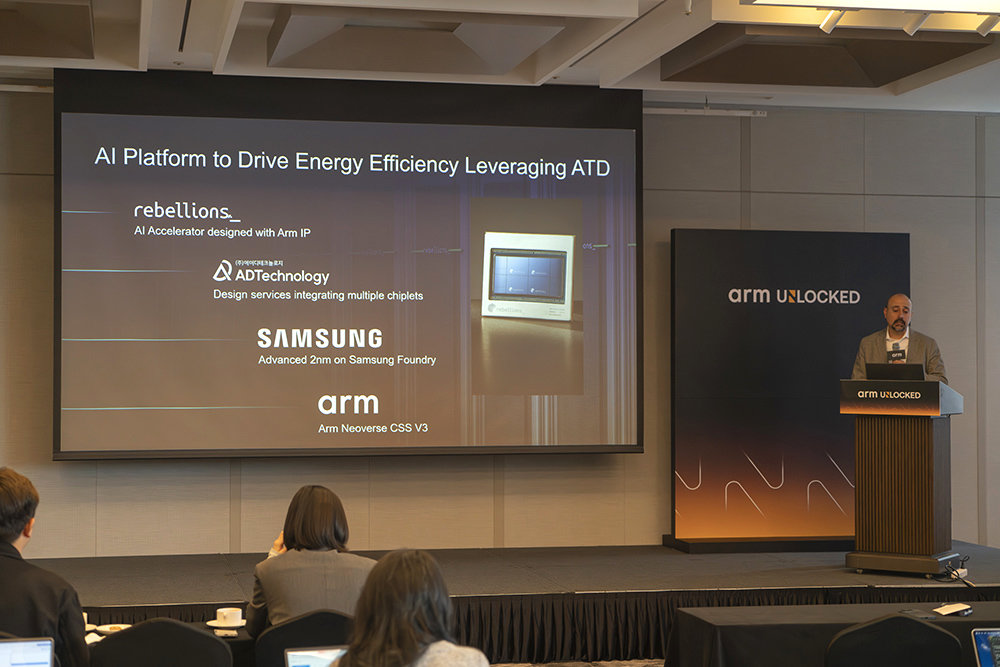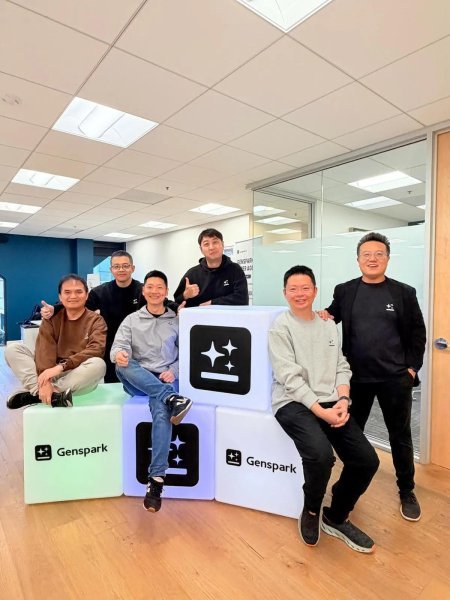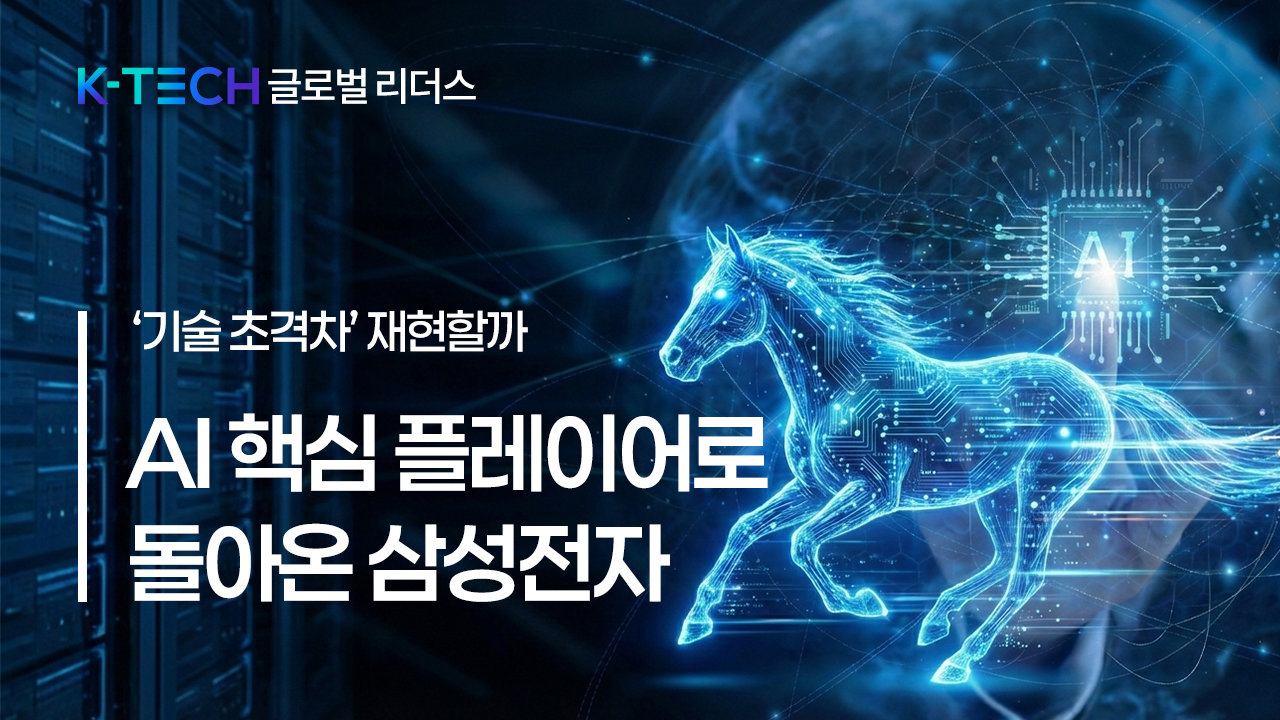
AI Trend
Arm Emerges as Semiconductor Hub with 'Unlocked Korea 2025'
Dong-A Ilbo |
Updated 2025.10.21
On October 21, 2025, global semiconductor asset company Arm hosted the 'Arm Unlocked Korea 2025' at the Grand InterContinental Seoul Parnas Hotel for companies based on Arm technology, semiconductor partners, and industry ecosystem stakeholders. Arm Unlocked Korea succeeds Arm's annual technology event, Arm Tech Symposia, but encompasses broader themes such as AI leadership and the transition to AI computing beyond semiconductor design and industry ecosystem collaboration.
This year's event was conducted under three themes: ▲ Automotive ecosystem ▲ Consumer devices including AI PCs, CPUs, and GPUs ▲ Infrastructure for AI data centers based on Arm CSS, Neoverse CSS, and standard chiplet integration, with participation from over 500 industry stakeholders. At the press conference, Eddie Ramirez, Vice President of Go-To-Market Strategy for Arm's Infrastructure Business Unit, presented Arm's AI semiconductor ecosystem strategy.
Eddie Ramirez stated, "Arm has provided over 1 billion Neoverse-based processors to data centers to date. AWS manufactured the 4th generation chip based on Arm's technology, and major cloud service providers such as Google, Microsoft, Oracle, and Alibaba are Arm's clients." He added, "Furthermore, Arm will lead the global server ecosystem by participating as the first board member of the 'Open Compute Project (OCP),' an open server design consortium for the standardization of global server infrastructure."
OCP is a new organization for collaboration with Arm, NVIDIA, and AMD to enable and design interoperable AI data servers. This effort aims to optimize power efficiency and design costs of server infrastructure and ensure future sustainability. OCP will work with major companies such as Meta, Google, Intel, and Microsoft to build interoperable designs.
Additionally, Arm provides the open framework FCSA (Open Chiplet System Design) to OCP for chiplet construction. Chiplets are a packaging technology that allows semiconductors manufactured through different processes to operate as a single product, reducing manufacturing costs of high-performance semiconductors and increasing performance efficiency. FCSA defines chiplet configuration methods, chiplet types, connection methods, and communication standards, and by providing this to OCP, a foundation has been established for more universal adoption of chiplet technology in the global standard server ecosystem.
Eddie Ramirez emphasized, "For AI compute architecture, heterogeneous computing design, which mixes various devices, is essential, and for chiplet technology to mature, technological standardization and integration must occur. Arm will continue to support both hardware and software ecosystems to ensure seamless AI processing in cloud AI processing, mobile, laptops, and wearable devices, and will continue to develop solutions for interoperability between systems."
Launched in October 2023, Arm Total Design has become a cornerstone of the Arm-based semiconductor manufacturing ecosystem. Eddie Ramirez stated, "Arm is present now. Smartphones are already the mainstream computing architecture, and autonomous vehicles are supported based on Arm. Now, AI rack design will also be innovated to support next-generation supercomputers. The challenge ahead is how to design custom chips and reduce costs." In this context, Arm Total Design is the way to increase design efficiency and reduce time and costs.
Currently, Arm Total Design includes 36 partner companies, with domestic participants such as Samsung Foundry, ADTechnology, SemiFive, and ASICLand. Last week, 10 new companies joined, including Korean companies CoAsia and ASE Korea, as well as Marvell, Alchip, VIA NEXT, insyde, AsteraLabs, CREDO, and eliyan.
A notable example of Arm Total Design is the chiplet project 'Leapfrog,' a collaboration between AI semiconductor company Rebellion, semiconductor design specialist ADTechnology, Samsung Foundry, and Arm. Leapfrog involves designing AI accelerator assets by Rebellion using Arm Neoverse CSS (V3), which ADTechnology designs and Samsung Foundry manufactures using a 2nm process. The AI semiconductors produced are used for artificial intelligence and machine learning inference.
Eddie Ramirez added, "The goal of Arm Total Design is to reduce the semiconductor design process, which takes about 2 to 3 years, to within 1 year. Although it's a challenging goal, it can be achieved through collaboration among semiconductor companies and chiplet design."
Arm is expanding beyond hardware to software and design ecosystems
Arm Unlocked is a venue to understand the future direction of Arm. While Arm has focused on semiconductor technology and assets, it is evolving into a company encompassing the entire IT ecosystem, including hardware and software, beyond semiconductor assets, following its NASDAQ listing. The goal is to diversify market influence and increase profitability. Efforts such as chiplet standardization through FCSA, establishing server ecosystem benchmarks through OCP, and building an Arm-based industry ecosystem through Arm Total Design are all strategies to expand Arm's influence.
While Arm's dominance in the semiconductor industry requires caution, it is a good business partner for South Korea, which competes with the United States, Taiwan, and Japan. Eddie Ramirez assessed the Korean semiconductor industry, stating, "Korea is a country where all companies can utilize the entire semiconductor supply chain, including foundries, custom semiconductors, third parties, intellectual property, and packaging. Additionally, with the Korean government's strategic investment in AI, the AI-related ecosystem and startups are rapidly emerging. Korea will play a unique role in the future AI innovation society."
Given the participation of many Korean companies in Arm Total Design, it is necessary to establish more proactive cooperative relationships.
IT Donga Reporter Nam Si-hyun (sh@itdonga.com)
This year's event was conducted under three themes: ▲ Automotive ecosystem ▲ Consumer devices including AI PCs, CPUs, and GPUs ▲ Infrastructure for AI data centers based on Arm CSS, Neoverse CSS, and standard chiplet integration, with participation from over 500 industry stakeholders. At the press conference, Eddie Ramirez, Vice President of Go-To-Market Strategy for Arm's Infrastructure Business Unit, presented Arm's AI semiconductor ecosystem strategy.
Eddie Ramirez, Vice President of Go-To-Market Strategy for Arm's Infrastructure Business Unit / Source=IT Donga
Eddie Ramirez stated, "Arm has provided over 1 billion Neoverse-based processors to data centers to date. AWS manufactured the 4th generation chip based on Arm's technology, and major cloud service providers such as Google, Microsoft, Oracle, and Alibaba are Arm's clients." He added, "Furthermore, Arm will lead the global server ecosystem by participating as the first board member of the 'Open Compute Project (OCP),' an open server design consortium for the standardization of global server infrastructure."
Arm announced its joining of the 'Open Compute Project' with NVIDIA and AMD for interoperability in AI data centers / Source=IT Donga
OCP is a new organization for collaboration with Arm, NVIDIA, and AMD to enable and design interoperable AI data servers. This effort aims to optimize power efficiency and design costs of server infrastructure and ensure future sustainability. OCP will work with major companies such as Meta, Google, Intel, and Microsoft to build interoperable designs.
Additionally, Arm provides the open framework FCSA (Open Chiplet System Design) to OCP for chiplet construction. Chiplets are a packaging technology that allows semiconductors manufactured through different processes to operate as a single product, reducing manufacturing costs of high-performance semiconductors and increasing performance efficiency. FCSA defines chiplet configuration methods, chiplet types, connection methods, and communication standards, and by providing this to OCP, a foundation has been established for more universal adoption of chiplet technology in the global standard server ecosystem.
Arm collaborates across the industry, from semiconductor design assets to foundry connections, services, and commercial software utilization / Source=IT Donga
Eddie Ramirez emphasized, "For AI compute architecture, heterogeneous computing design, which mixes various devices, is essential, and for chiplet technology to mature, technological standardization and integration must occur. Arm will continue to support both hardware and software ecosystems to ensure seamless AI processing in cloud AI processing, mobile, laptops, and wearable devices, and will continue to develop solutions for interoperability between systems."
The 'Arm Total Design' semiconductor design service has 32 participating companies two years after its launch / Source=IT Donga
Launched in October 2023, Arm Total Design has become a cornerstone of the Arm-based semiconductor manufacturing ecosystem. Eddie Ramirez stated, "Arm is present now. Smartphones are already the mainstream computing architecture, and autonomous vehicles are supported based on Arm. Now, AI rack design will also be innovated to support next-generation supercomputers. The challenge ahead is how to design custom chips and reduce costs." In this context, Arm Total Design is the way to increase design efficiency and reduce time and costs.
Currently, Arm Total Design includes 36 partner companies, with domestic participants such as Samsung Foundry, ADTechnology, SemiFive, and ASICLand. Last week, 10 new companies joined, including Korean companies CoAsia and ASE Korea, as well as Marvell, Alchip, VIA NEXT, insyde, AsteraLabs, CREDO, and eliyan.
Arm highlighted the collaboration between Rebellion, ADTechnology, and Samsung Foundry as an exemplary case / Source=IT Donga
A notable example of Arm Total Design is the chiplet project 'Leapfrog,' a collaboration between AI semiconductor company Rebellion, semiconductor design specialist ADTechnology, Samsung Foundry, and Arm. Leapfrog involves designing AI accelerator assets by Rebellion using Arm Neoverse CSS (V3), which ADTechnology designs and Samsung Foundry manufactures using a 2nm process. The AI semiconductors produced are used for artificial intelligence and machine learning inference.
Eddie Ramirez added, "The goal of Arm Total Design is to reduce the semiconductor design process, which takes about 2 to 3 years, to within 1 year. Although it's a challenging goal, it can be achieved through collaboration among semiconductor companies and chiplet design."
Arm is expanding beyond hardware to software and design ecosystems
Arm Unlocked is a venue to understand the future direction of Arm. While Arm has focused on semiconductor technology and assets, it is evolving into a company encompassing the entire IT ecosystem, including hardware and software, beyond semiconductor assets, following its NASDAQ listing. The goal is to diversify market influence and increase profitability. Efforts such as chiplet standardization through FCSA, establishing server ecosystem benchmarks through OCP, and building an Arm-based industry ecosystem through Arm Total Design are all strategies to expand Arm's influence.
While Arm's dominance in the semiconductor industry requires caution, it is a good business partner for South Korea, which competes with the United States, Taiwan, and Japan. Eddie Ramirez assessed the Korean semiconductor industry, stating, "Korea is a country where all companies can utilize the entire semiconductor supply chain, including foundries, custom semiconductors, third parties, intellectual property, and packaging. Additionally, with the Korean government's strategic investment in AI, the AI-related ecosystem and startups are rapidly emerging. Korea will play a unique role in the future AI innovation society."
Given the participation of many Korean companies in Arm Total Design, it is necessary to establish more proactive cooperative relationships.
IT Donga Reporter Nam Si-hyun (sh@itdonga.com)
AI-translated with ChatGPT. Provided as is; original Korean text prevails.
ⓒ dongA.com. All rights reserved. Reproduction, redistribution, or use for AI training prohibited.
Popular News







